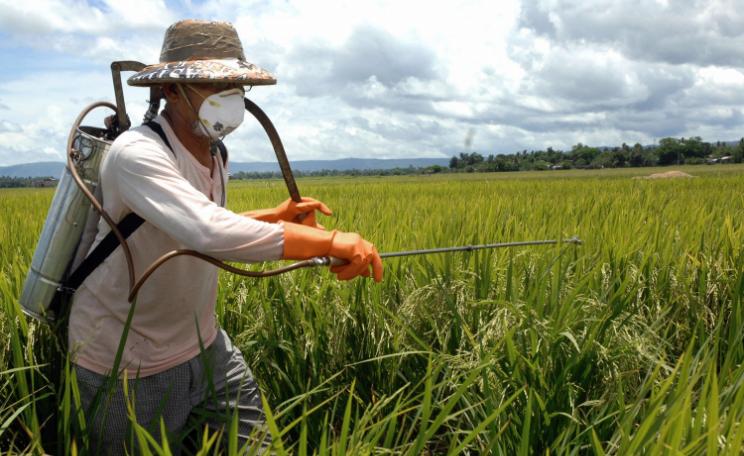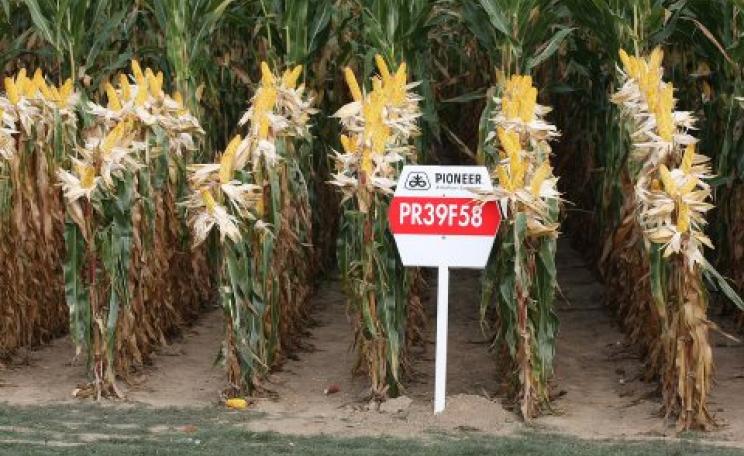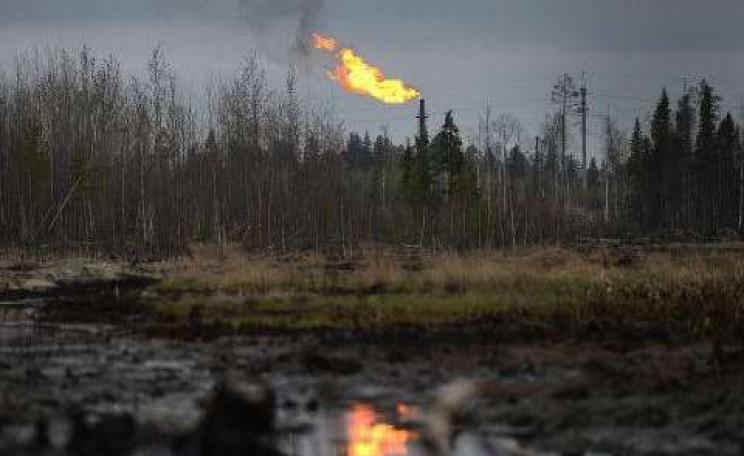Cattle in a paddock on a small farm in Russia. But will the new regulations force small farmers and their animals out of business? Photo: Vmenkov CC.
I'm convinced these regulations weren't brought in for the benefit of the common man. Villagers won't see any benefit from this, only the costs. The feudal lords will win.
Fresh meat is disappearing from many dinner tables across Russia, while frozen meat has drastically increased in price.
Yet this is just the beginning; a new law on meat production and food safety came into force across the Customs Union (comprising Russia, Belarus and Kazakhstan) on 1 May, with wide ranging consequences.
Its effects were easy to foresee but impossible to avoid, thanks to bureaucratic inefficiency and the new regulations, which are entirely incompatible with the daily realities of rural life in many Russian regions.
Siberians are no exception. Owners of private farms across the Omsk Region insist that the rules urgently need changing. If they are not, several thousand families will be deprived of their primary (if not sole) source of income.
New regulations are out of touch with reality
The new regulations are entirely incompatible with the daily realities of rural life in many Russian regions. The new regulations forbid the sale of meat from animals slaughtered on farmers' own property. Livestock can now be slaughtered only in abattoirs or slaughterhouses officially registered with the state.
Given that there are no such slaughterhouses across a quarter of the province's rural areas, local farmers are now presented with a dilemma: do they break the law and continue to slaughter meat themselves, or do they comply with it, and make a long and arduous journey to one of the few state registered slaughterhouses?
The former is illegal; the latter is not economically viable.
Yury Falkenberg, head of the village of Verkhny Karbush, has been raising pigs on his property for more than 20 years, and keeps a herd of 30.
"We still have about a dozen household farms - some have 15-20 swine, some have up to 50. I can tell you plainly, these new regulations will be the end of all of them. The guys all told me they'll give it up. There's no sense in keeping pigs here anymore.
"Even so, we have it easy compared to villages further away; it's 10km to the nearest slaughterhouse. Still, we may spend less on petrol, but all the same we can't break even."
Small farmers must carry an insupportable burden
Until recently, continues Falkenberg, the standard practice was to slaughter the animal on the premises, and have the meat inspected by the local veterinarian, who issued a certificate. The farmer would then take the certificate to the regional veterinary hospital, who would place a tag on the carcass, after which it would be fit to sell at the market.
"Now doing the killing yourself is forbidden. You have to bring the animal alive to the slaughterhouse, order a car and buy special equipment. Getting a pig to the container is a whole other hassle.
"If a pig isn't used to being in pens, just try getting it to go in there. I can't manage it on my own, and can't load a 100kg container into my car - it's a two-man job at least. Transporting a pig will always lead to injuries, and bruised meat is naturally thrown away. If the journey is long, the losses can be significant."
I'm convinced these regulations weren't brought in for the benefit of the common man. Villagers won't see any benefit from this, only the costs. The feudal lords will win.
When the farmers finally reach the abattoir there is a queue. It moves slowly. Before being slaughtered the animals must be inspected. Very occasionally, the animals pass the examination before the evening; if they don't, they must be brought back the next day.
In the best-case scenario, farmers can leave their livestock at the abattoir and return in the morning. A tag costs 300 roubles (£5), and refrigeration (obligatory under the new regulations) 200 roubles (£3.50). To have the carcass cut up costs farmers some 700 roubles (£12.50).
"Now work it out", asks Yury. "I spend 9,000 roubles (£150) on feed for a sow, and a whole year looking after her ... Ideally, when fattened up to 100 kg, a pig like that could be sold on the market for 12,000 roubles (£210). Taking all these new expenses into account, I can't break even. And what of this abattoir were 50km or 100km away?
"Also, consider that when we slaughter livestock, we bleed it out completely. They don't do that in the abattoir. It's killed with one blow. The meat goes black. What kind of slaughtering is that?"
Fattening up the oligarchs
Sergei Boigachev, a farmer from Omsk, with 15 years of experience, is convinced that not only small-scale farmers will end up "in the red", but also smallholders keeping 150 to 200 animals.
"The meat produced by small farms is cleaner and healthier. Everyone knows what livestock in factory farms are fed. I know two dozen people who practice animal husbandry and they all say it's time to get out of the business. What's a peasant to live on? What did we deserve to be put in such a bind?
"The meat produced by small farms is cleaner and healthier. Everyone knows what livestock in factory farms are fed. How can you raise a 100kg pig in half a year without chemicals? That's not natural.
"I give my piglets a clean diet - barley, wheat, oats, pumpkin, and beets. There are no artificial stimulants for growth in a peasant's meat. We slaughter livestock the same way our forefathers have done for centuries.
"I'm convinced these regulations weren't brought in for the benefit of the common man. Villagers won't see any benefit from this, only the costs. The feudal lords will win."
Sergei maintains that the regulations were brought in to comprehensively drive small-scale farmers out of the market, and give the entire industry to "meat oligarchs" who will "fob off the people with supplements and GMOs" and "kangaroo and buffalo meat" brought into Russia from overseas.
Economists agree. According to the Tambov edition of the newspaper Argumenty i Fakty, the head of the Federal Service for Veterinary and Phytosanitary Surveillance, Sergei Drankvert, told the Federation Council that "today the regulations reflect more the wishes enforced on Russia than from her."
Drankvert isn't against a more civilised slaughter of livestock, but proposes that "first the infrastructure must be put in place" before new rules are introduced.
Local government 'completely unprepared' across Russia
I was unable to find any region whose local government had formally announced that it was adequately prepared for the new regulations. The lack of abattoirs in Tyumen Region is even more acute than in Omsk; the head of the Vikulovksy district animal welfare station, Andrei Safanov, admitted as much in Rossiiskaya Gazeta.
One abattoir serves fifty villages, says Safanov; and it has existed for as long as anyone can remember. So the villagers have to take their livestock to Ishim, 120km away or even further to Kazan district. Transport costs can reach several thousand roubles.
And as in Omsk Region, the slaughter itself doesn't come cheap. The slaughterhouse charges about 6000 roubles (£100) for a 300kg bullock, and about 2000 roubles (£35) for a pig. As may be expected, in many districts there simply aren't any slaughter facilities at all.
The regulations were brought in to drive small-scale farmers out of the market, and give the entire industry to 'meat oligarchs.' On the other side of the Urals the picture is the same.
Rostov Region, where slaughtering animals on private farms was already forbidden two years ago by local authorities, locals had to create small-scale slaughtering facilities.
Aleksei Yermakov, Director of the local animal welfare centre, admitted that not one was prepared for the new regulations. Such facilities were likely to face closure, he added, forcing smallholders to travel long distances to slaughter their livestock.
Long in gestation - but still unprepared for
The authorities should have ensured that slaughtering facilities were in place long ago - after all, the regulations were brought in by the Council of the Eurasian Economic Commission on 9 October 2013, but it seems that civil servants were hoping that their introduction could be avoided.
"We assumed to the last second that the deadline for the introduction of the new regulations by the Russian Government would be put off - for a few months, for a year, there are legal precedents", stated Nikolai Drankovich, deputy head of the regional agricultural ministry.
Experts in Novosibirsk, estimate the costs of organising one of these slaughterhouse facilities at around 8m-10m roubles (£140,000-£175,000). The majority of farmers - not to mention small household farms - could never hope to raise this amount even if they pooled their resources.
Tambov farmer Andrei Vasilyev believes that the only solution is the creation of "co-operative slaughter facilities" (of the simplest type possible), built with the help of government financing. One strategy is to "organise the purchase of livestock raised on household farms, and then send them to a humane slaughterhouse."
Huge price hikes are unavoidable
Experts in practically every region, say that a significant increase in the market price of meat is now unavoidable. According to DVNovosti, the price of a kilogramme of beef in Khabarovsk Territory could rise to 800 roubles (£13); the local price there at the moment is, on average, 293 roubles (£5.11).
"People will stop eating meat, and farmers will have to close their farms", says Mikhail Volkov, whose Khabarovsk-based business specializes in the production of pork. "Our farmers predict that meat at the market will triple in price. At least."
In Omsk, meanwhile, the production costs of the leading meat companies have risen on average by 60 roubles (£1) a kilogramme since the introduction of the regulations - a full 25%. Irina Drozdova, head of Omsk's local branch of the 'For Human Rights' organisation, and member of the local assembly, is convinced they will increase further.
"I don't keep birds or livestock myself. I just don't have the time. But I try to buy village products. They're better and cheaper. You can't compare an egg from a battery farm to one from a village farm. They're not even the same colour.
"Now it seems our smallholders and their fellow villagers won't be able to sell anything. Our farmers predict that meat at the market will triple in price. At least."
Three years ago, President Putin spoke of the importance of small-scale farming, at the congress of the Association of Peasant Farmers, and promised to support them in any way possible. Drozdova hopes that Putin was serious; and is now gathering signatures to appeal to the President.
Farmers protest the 'meat monopolists'
In May, farmers from across the region gathered in Omsk to protest against the 'meat monopolists' and the new Customs Union rules. The protesters were joined by traders whose business has also been affected.
If the situation gets worse, it is likely that the protesters will be joined by consumers as well. Even The local Omsk authorities could join them: Vladimir Okolelov, the head of Omsk Region's main veterinary centre, gave the 'Siberian Agreement' (MASS) Association a formal petition signed by 350 people, requesting that the introductory period of the regulations be extended. Okolelov gave the same petition to the Customs Union
Okolelov's petition was also sent to Deputy Prime Minster Igor Shuvalov, while the governor of Omsk Region, Viktor Nazarov, requested that local Minister of Agriculture, Vitaly Erlikh, "work out who has an interest in prices rising ...
"If the reason is the Customs Union, if there was a backroom deal, we need to get the Prosecutor's office, the law enforcement agencies and the Anti-monopoly Service involved."
A loophole emerges - but how long for?
Having heard the demands of the protesters, the regional government has found a loophole in the regulations, and introduced its own 'temporary rules,' which will be in effect across the region, "until the introduction by the federal government of a legal act, containing requirements on specially set aside [abattoirs]."
"If the government doesn't offer serious help to the village farmer, then the consequences will be disastrous."
According to these local (and temporary) rules, in places lacking facilities for slaughtering animals, smallholders may "carry it out on site (on the farm)."
It is also "permitted for the meat to be used for more than personal consumption", and "to take the meat to agricultural markets in towns and the region's districts, where a state laboratory with veterinary expertise has been established."
But it's not known how long the temporary rules will remain in effect. The head of the Omsk Association for Development of Small and Medium Enterprise, Vadim Morozov, foresees disaster: "If the Government doesn't offer serious help to the village farmer", he told the news portal SuperOmsk, "then the consequences will be disastrous.
"The monopolists will use this situation to drive up prices. There will be no meat at the markets, no slaughter of farmers' livestock ... If this goes on, the amount of meat from big producers will just keep on growing, as will the prices."
Georgy Borodyansky is an Omsk-based correspondent forNovaya Gazeta.
Related Articles on Open Democracy
- A burning issue in Siberia
- Russian provincial life: down on the farm
- The death of the Russian village
This article was originally published by Open Democracy under a Creative Commons Attribution-NonCommercial 3.0 licence.






